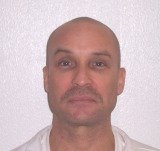A man facing the death penalty for raping and killing his niece -- the daughter of a legislator -- can go back to trial court for post-conviction relief after an Arkansas Supreme Court ruling Thursday.
Karl Roberts was mentally unfit when he waived his rights to post-conviction reviews, according to a majority of the Arkansas Supreme Court, which sent Roberts' most recent appeal of his execution sentence back to Polk County Circuit Court.
Roberts, now 48, was first convicted and sentenced to death in 2000 in the 1999 murder of Andi Brewer, 12, whose body was buried outside Mena.
His execution has been delayed by a range of appeals as well as a competency hearing held in 2014 in which Circuit Judge J.W. Looney found that Roberts both "knowingly and intelligently" waived his rights to a post-conviction appeal.
The girl's mother is state Rep. Rebecca Petty, R-Rogers. Last year, Petty sponsored legislation that would become known as "Andi's Law," which expanded the number of family members that could be present for an offender's execution.
After his conviction, Roberts waived his rights to an appeal. But on the day of his scheduled January 2004 execution, he asked for and was granted a stay in federal court. The case was then sent back to state court.
After hearing evidence and testimony from two mental-health experts, Looney ruled that Roberts had "the capacity to choose between life and death" when Roberts sent the court a letter in September 2013 once again waiving his right to relief. Looney then dismissed Roberts' challenge of his sentence.
The majority of the state's justices, four, and all but one of the three dissenters, agreed that the testimony showed that Roberts' mental health was suspect.
Writing for the majority, Justice Rhonda Wood said death-row inmates can waive their rights only to post-conviction relief if they understand the distinction between life and death and can "knowingly and intelligently" waive their rights.
A psychological expert who testified for the state found Roberts suffered from schizophrenia as well as auditory and visual hallucinations and delusions.
The expert would not venture a guess as to whether Roberts was of sound mind, but said Roberts' decision-making was "colored by his psychotic experiences" and there was "significant concern" over whether the inmate could make a rational choice about life and death.
A psychologist brought in by Roberts' attorney testified that Roberts' thinking was "clouded by his psychosis," and that expert testified he didn't think Roberts could distinguish between life and death.
"The evidence before [Looney] evinces that it is undeniable that Roberts suffers from schizophrenia, that these symptoms of his psychological disorder clearly impact his ability to choose between life and death and to knowingly and intelligently waive his appeal rights," Wood wrote. "And the State's own expert could not conclusively find that Roberts' rational reasoning was greater than his psychotic reasoning."
Dissenting justices wrote that Looney's order did not follow procedure and it left justices with no insight to his ruling.
Joined by Justice Paul Danielson in a dissenting opinion, Chief Justice Howard Brill wrote that the majority overstepped its bounds and should have sent the case back to lower court for a better ruling.
"The majority engages in fact-finding that is within the exclusive province of the circuit court," Brill wrote. "This court has repeatedly stated that it does not try issues of fact. ... Further, as a matter of policy, this court should be wary of making conclusive findings of fact on a competency issues in a death-penalty case."
In her separate dissenting opinion, Justice Courtney Goodson wrote that she would uphold Looney's ruling.
Metro on 03/18/2016
